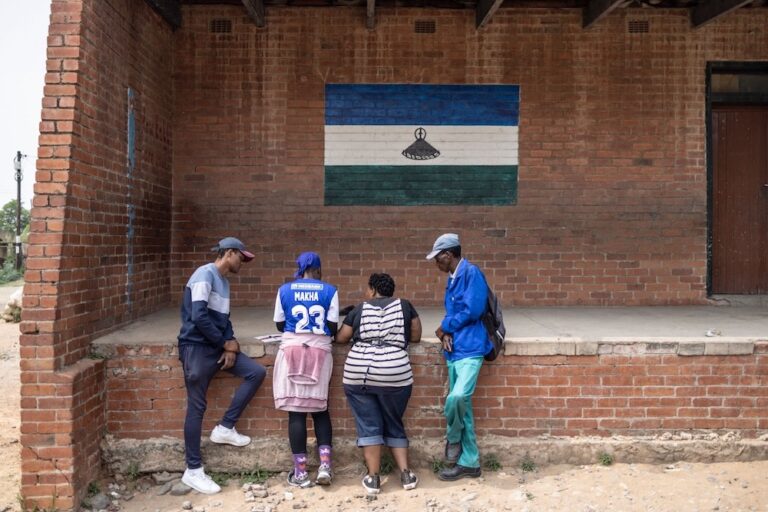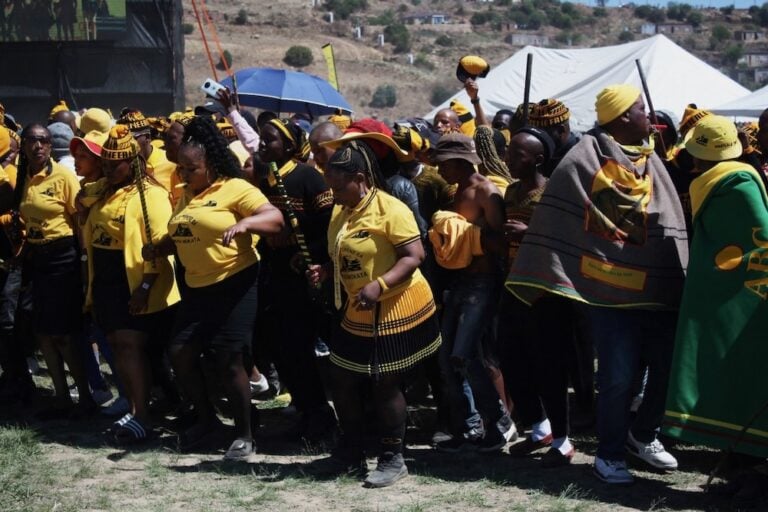(MISA/IFEX) – According to MISA, on 7 October 1998 the Minister of Communications, ‘Nyane Mphafi, instructed state-employed journalists who “were seen at opposition demonstrations” to write letters of resignation or face summary dismissal. Journalists were called to a meeting by the minister, who informed them that there was a black list of those who took […]
(MISA/IFEX) – According to MISA, on 7 October 1998 the Minister of
Communications, ‘Nyane Mphafi, instructed state-employed journalists who
“were seen at opposition demonstrations” to write letters of resignation or
face summary dismissal.
Journalists were called to a meeting by the minister, who informed them that
there was a black list of those who took part in the September opposition
demonstration outside the gates of the Royal Palace. State media were closed
for a week, from 17 to 23 September, after protesters forced all government
workers to stay home to show support for their protest. As a result, all
workers, including journalists, stayed home. Public transport was also
stopped from carrying workers. State media were only re-opened on 23
September, after the intervention of Southern African Development Community
(SADC) forces, who went on guard outside the radio station.
Mphafi told journalists that some civil servants were seen taking part in an
illegal sit-in protest staged by the opposition parties outside the palace.
They were protesting Lesotho’s 23 May general election results on grounds
that they had been rigged in favour of the ruling Lesotho Congress for
Democracy (LCD).
Journalists at the Ministry of Communications view the threat as an attempt
by the minister to victimise those journalists who do not support the ruling
party. Most of the journalists interviewed by the Media Institute of Lesotho
(MILES) said they failed to understand the minister’s intentions because
their professional job required them to always be present where incidents
were occuring. “I think the government is trying to find vacancies to slot
their card carrying members,” said one of the journalists. The journalists
have declined to write letters saying the minister should reveal the black
list and tell them who is liable for dismissal.
The Ministry of Communications has under its direct daily management the
state-owned Radio Lesotho, Lesotho Television, the government weekly
newspaper and the Lesotho News Agency. The ministry employs between 200 and
250 workers, about 100 of whom are journalists and information officers.
The minister was not available for comment when contacted by MILES. The
principal secretary, Mpine Tente, said she was also confused by the
statement made by the minister and had some questions herself. She said she
would not comment because she still had to find out from the minister why he
asked journalists to resign.
Journalists working for the private media have condemned the action saying
it is very undemocratic. Leboela Motopi, a journalist with “Public Eye”
newspaper, says the whole idea of coercing journalists to resign because of
their political inclination is not suited to the democratic environment.
MILES believes the action taken by the minister is a violation of
journalists’ right to freedom of information and will hamper free flow of
information, as journalists working for the powerful government media will
be afraid of soliciting certain information from the public.
The threat made by Mphafi is not unique to the Ministry of Communication.
Government ministers have issued a verbal threat to all civil servants that
they should resign before they are dismissed. For example, the minister of
foreign affairs, Tom Thabane, told the civil servants in the ministry that
if they do not resign within seven days and get their benefits, they will be
summarily dismissed, in which case they will lose all their benefits.
Background Information
Threats of dismissal of journalists working for the government media are
part of a broader campaign by the government of Lesotho to rid the
government of all pro-opposition civil servants, especially those who were
allegedly seen at opposition rallies.
The three main opposition parties in the country, the Basotho National Party
(BNP), the Basutoland Congress Party (BCP) and the Marematlou Freedom Party
(MFP), staged a protest on 4 August demanding the dissolution of parliament
and its government, the formation of a transitional government of national
unity and fresh elections. They alleged that the 23 May general elections
were rigged. The ruling LCD won 79 of 80 seats in parliament.
Since 4 August, Lesotho has been engulfed by political mayhem that has
resulted in the destruction of property, looting and the killing of people.
Recommended Action
Send appeals to the Prime Minister and the Minister of Communications:
not subscribe to the ideologies of the ruling party is a violation of
peoples’ right of association and right to choose
and
disseminate
information to the public and that there should be no barrier blocking the
movement of journalists
because
they were seen at opposition rallies is a violation of press freedom and
freedom of expression and further threatens the free flow of information as
journalists may decide to be associated with the ruling party to save their
jobs. They may also fear to cover the opinions of those who do not agree
with the ruling party
expression as
provided for in Lesotho’s national constitution, section 14
Appeals To
Prime Minister Pakalitha Mosisili
Prime Minister’s Office
Government Complex – Qhobosheaneng
PO. Box 527
Maseru 100, Lesotho
Fax: +266 310559 / 320578Minister ‘Nyane Mphafi
Ministry of Communications
PO. Box 26
Maseru 100, Lesotho
Fax: +266 322500
Please copy appeals to the source if possible.
For further information, contact Puleng Latela, Information Officer at
MILES, PO. Box 14130, Maseru 100, tel: +266 320941, fax: +266 310560,
e-mail: medinles@lesoff.co.za.
or
Bright Mwape or Raashied Galant at MISA, Street Address: 21 Johann Albrecht
Street, Mailing Address; Private Bag 13386 Windhoek, Namibia, tel: +264 61
232975, fax: +264 61 248016, e-mail: bright@ingrid.misa.org.na,
research@ingrid.misa.org.na, Interne


